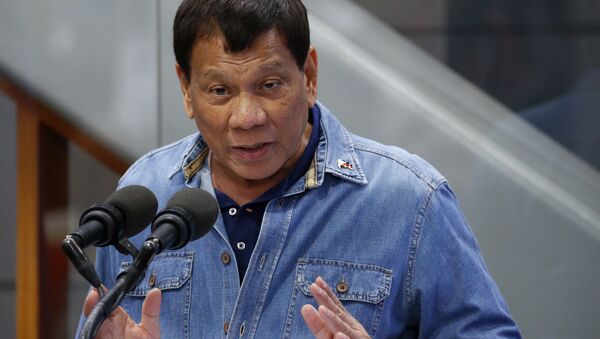Speaking at the opening of Chen Yi Agventures Rice Processing Centre in Alangalang, Philippine President Rodrigo Duterte warned Washington about possible consequences should a conflict with Beijing break out over the South China Sea.
“There is always America pushing us, egging us […] making me the bait. What do you think Filipinos are, earthworms? Now I say, you bring your planes, your boats to South China Sea. Fire the first shot and we are just here behind you. Go ahead, let’s fight. We have an RP-US pact, so let us honour it. Do you want trouble? OK, let’s do it”, Duterte said, in a nod to the US-Philippines Mutual Defence Treaty.
He warned that “we can never win a war with China”, expressing hope that Beijing “would not overdo things”.
Duterte also lashed out at his critics, including Supreme Court Senior Associate Justice Antonio Carpio, former Foreign Secretary Albert del Rosario and former Ombudsman Conchita Carpio Morales for slamming his policy on China.
“If war breaks out, I will drag them out”, Duterte added.
The past seven months have seen a number of controversial statements by Duterte with regard to Beijing’s South China Sea-related claims.
He is often criticised in the Philippines over his alleged backtracking after pressure from China following a major victory at the international maritime tribunal, which ruled Beijing's claims to islands that the Philippines dispute as ungrounded. China rejected the court's ruling and argued that the tribunal had no jurisdiction in the case.
In late May, Duterte urged China to actively participate in the development of a code of conduct for operations in the disputed waters of the South China Sea warning that "the longer it takes" the greater the chances that the region will become a "flashpoint of troubles".
The Philippine president also reiterated his earlier statements that he and his country are not in power to affect China's behaviour at sea, but at the same time added that he is "sad and bewildered" by Beijing's actions. He also questioned the legitimacy of the Asian country's claims to the territory, disputed by five other states.
“I love China […] but it behoves upon us to ask, 'is it right for a country to claim the whole ocean?’” Duterte said.
In April, he warned China against hostile actions involving the Philippine island of Pag-asa, vowing to send the military on "suicide missions" to defend it.
November saw Duterte warn Washington against bickering with Beijing over the South China Sea, which he conceded is already possessed by China.
"China is already in possession [of the South China Sea]. It's now in their hands. So why do you have to create frictions […] that will prompt a response from China? That's a reality, and America and everybody should realise that China is there", Duterte told journalists on the sidelines of the Association of Southeast Asian Nations (ASEAN) summit in Singapore.
Apart from Beijing, the Spratly Islands and Paracel Islands, which are among the more frequently disputed territories in the South China Sea, are also claimed by Taiwan, Vietnam, Malaysia, and the Philippines. China has exerted de facto control over the Paracels since 1974.
Washington, for its part, regularly sends military vessels to the region to conduct so-called “freedom of navigation” missions. Beijing considers such moves "provocations" and has called on Washington to stop the practice.




